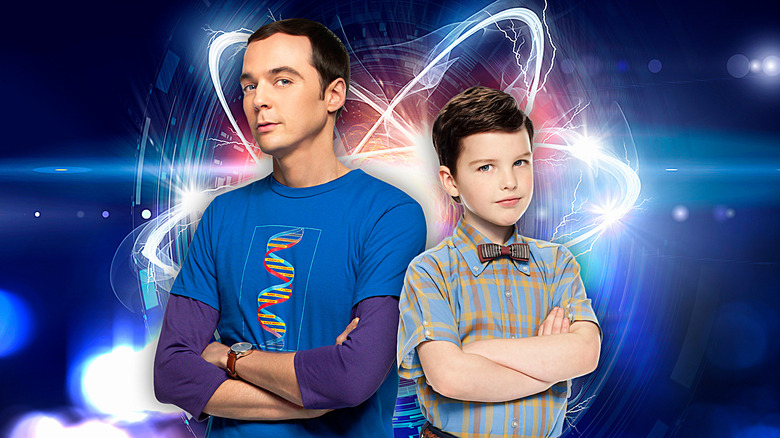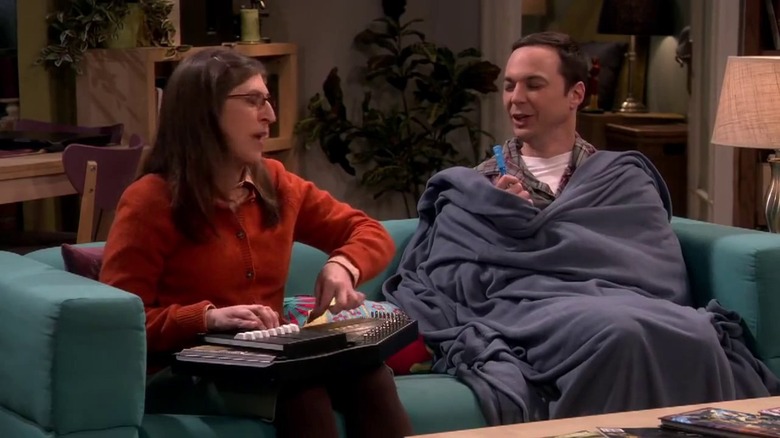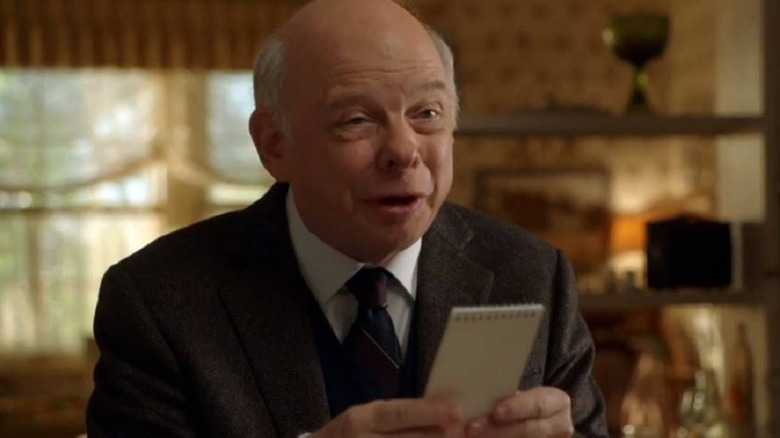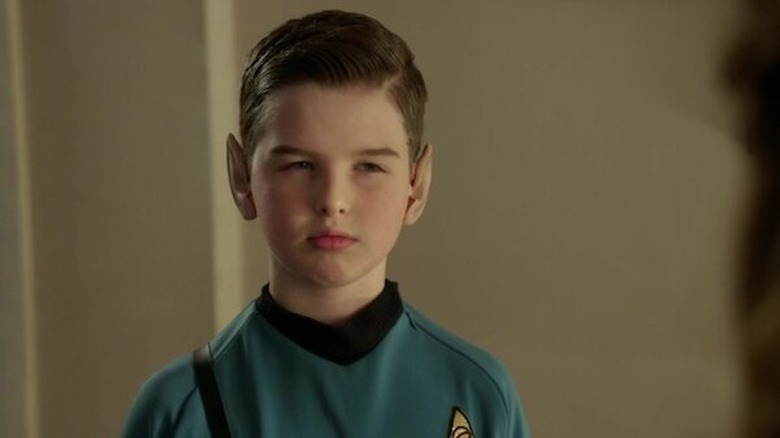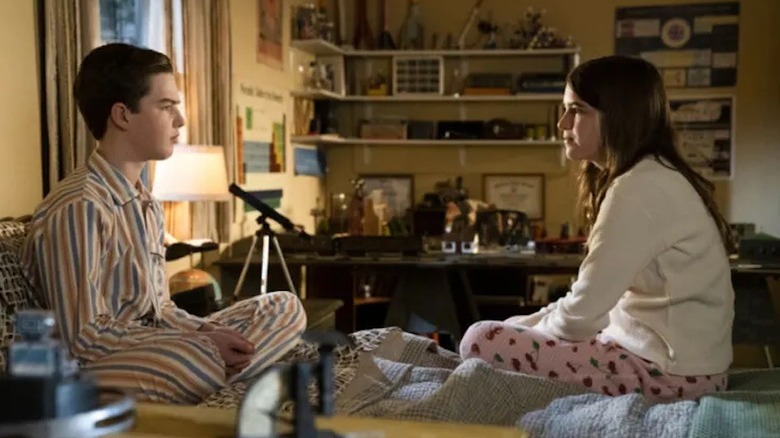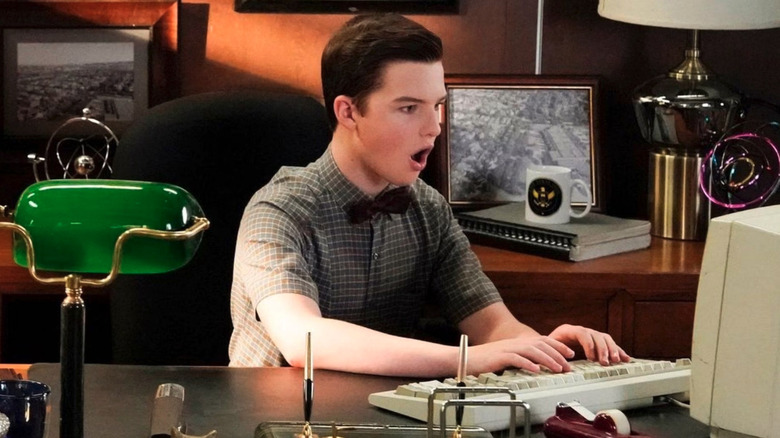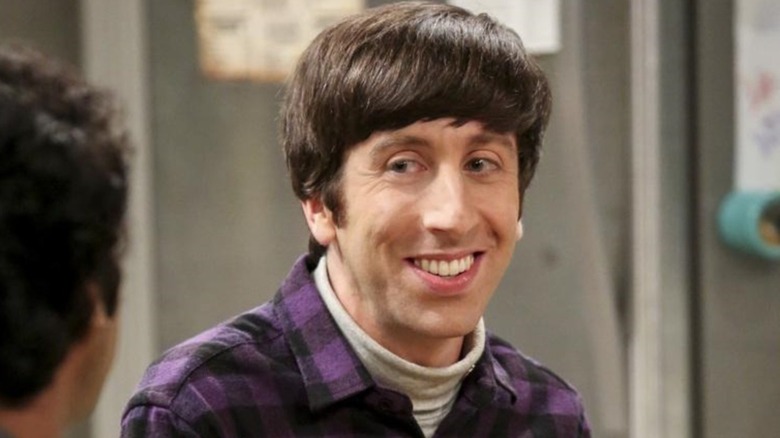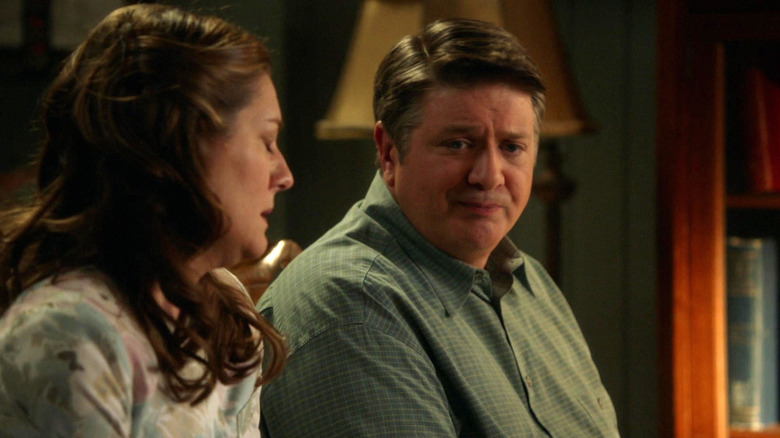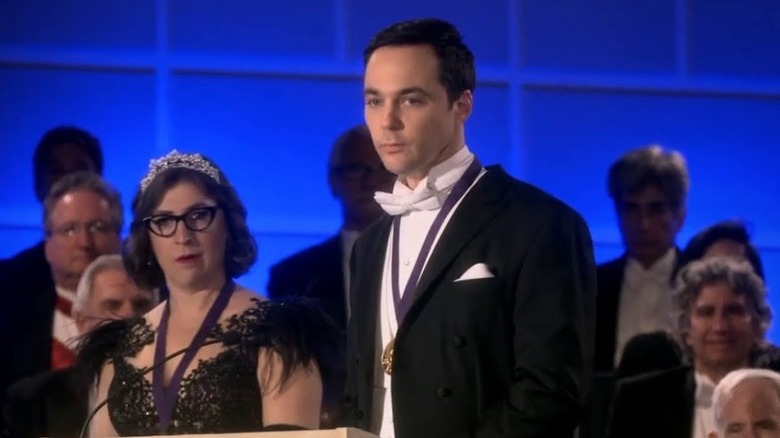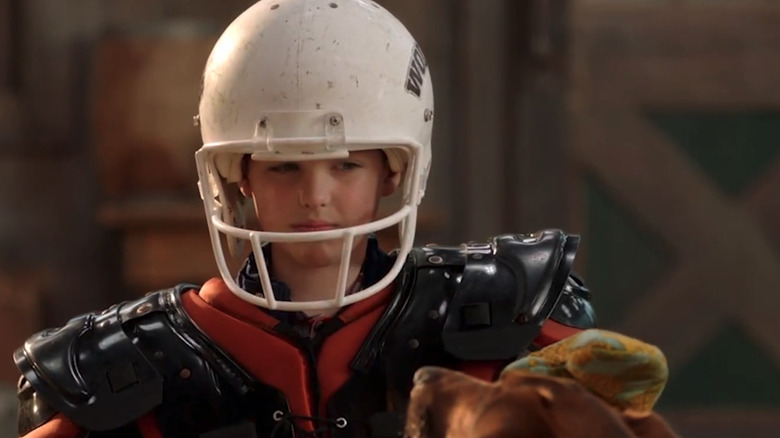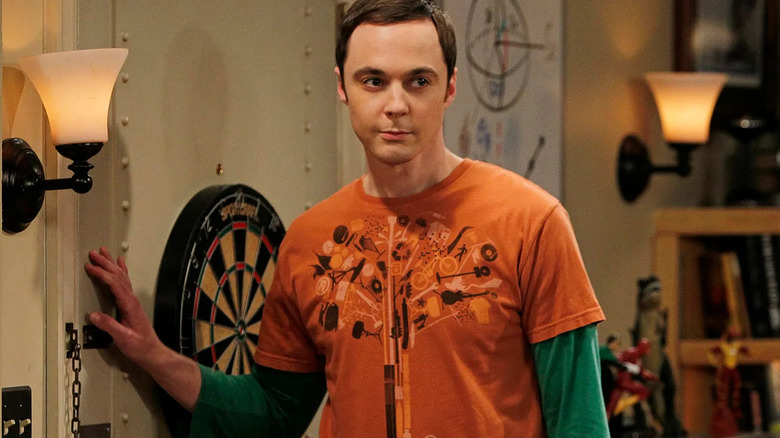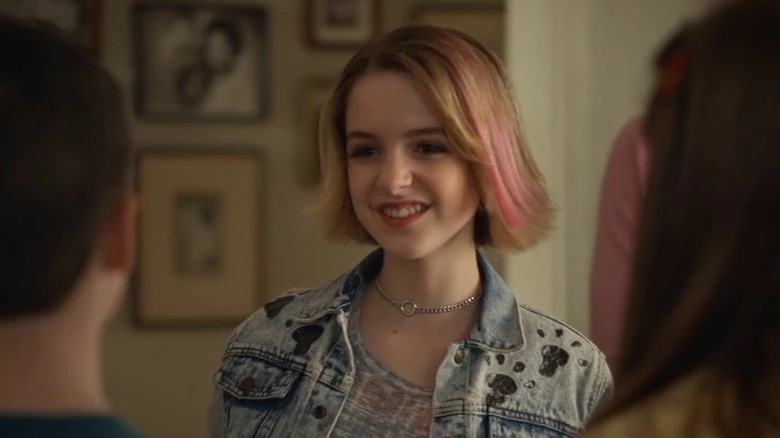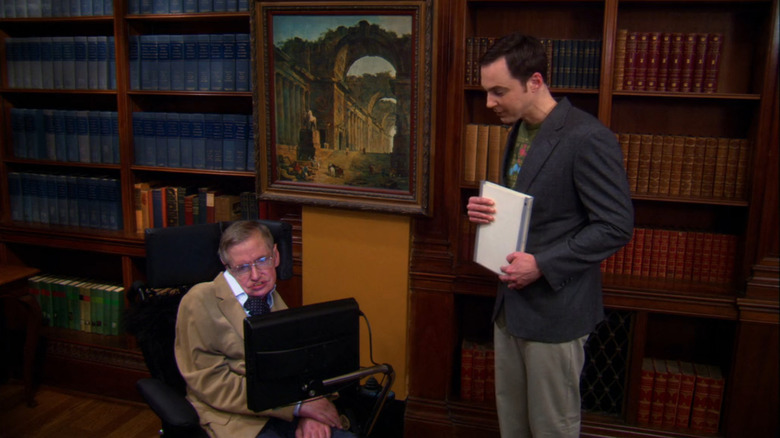5 Big Bang Theory Plot Holes Created By Young Sheldon, And 7 That Were Fixed
Nobody likes a plot hole, whether it's in a sprawling movie saga or a TV series. But there are many fans out there who love spotting them, and we don't just mean "plot holes" by their textbook definition; inconsistencies in a character's history, major plot points that don't make sense, or just head-scratching errors made by the writers that don't add up are all fair game. When it comes to prequels, though, there's a whole other level of complexity, as showrunners and producers must balance what makes a great story with lining up continuity with stories that take place years or even decades later.
For fans of "The Big Bang Theory" continuity has proven even more important since the debut of the prequel series "Young Sheldon." It began airing when "TBBT" was in its 10th season, so there was already a decade's worth of established lore that writers had to be mindful of. Most of the time, it wasn't an issue, but every now and then fans watching "Young Sheldon" spotted something that created a massive plot hole for the other series. While this has been frustrating for viewers, the show has also gone a long way to close many other plot holes over the course of the series.
Between both shows, there are plenty of unanswered questions. So, we've scoured Sheldon Cooper's adult escapades and childhood misadventures and found quite a few plot holes created by the prequel — along with quite a few that "Young Sheldon" fixed.
Plot Hole: The Sick Song Solution
On "The Big Bang Theory," quirky Sheldon Cooper has his share of strange eccentricities, like his favorite seat on the couch or his three knocks on the door. Perhaps one of his most famous, though, is his use of the song he calls "Soft Kitty" when he or someone else is sick. As he explains, it's a children's lullaby that his mother sang to him when he got sick. Moreover, when Penny is hurt and wants Sheldon to sing her the lullaby he refuses, insisting that the only time the song should ever be sung is when someone is ill, not injured.
In "Young Sheldon," we get a reprisal of "Soft Kitty" when Sheldon gets the flu and we essentially get the origin of his love for the lullaby. But we also get another use of the song in the episode "Teen Angst and a Smart-Boy Walk of Shame," which presents something of a problem for Sheldon's earlier comments on "The Big Bang Theory." In that episode, Mandy is having problems getting her daughter to stop crying, and Sheldon decides he can do better. His trick of choice is singing the baby "Soft Kitty," even though the little one isn't actually sick.
Does this mean that he lied to Penny and simply didn't want to sing the song? Or is it just a case of Sheldon breaking his own rule in an emergency for the sake of a baby?
Solved: The Sturgis Sublimation
When "Young Sheldon" was first announced, fans of "The Big Bang Theory" probably expected the supporting cast around the title character to include younger versions of his family and friends. And while that is the case, there are also a handful of new characters who become central to the show with none more important than Dr. Sturgis, a teacher whom Sheldon becomes particularly close to early in the series.
Played by Wallace Shawn of "Clueless" and "The Princess Bride" fame, Sturgis becomes a mentor to young Sheldon, encouraging him in ways that few in his life ever have. He is the rare adult who appreciates Sheldon's genius and understands his problems and is nearly a father figure in some ways. Given their close relationship, many fans thought his importance to Sheldon's youth presents a pretty gaping plot hole for "The Big Bang Theory." After all, if Sturgis is so important to Sheldon's formative years, why hasn't Sheldon ever mentioned him?
The real reason, of course, is that Sturgis hadn't been created yet, but the writers of "Young Sheldon" closed that plot hole later in the series. In "Little Green Men and A Fella's Marriage Proposal," Sheldon has a massive falling out with Dr. Sturgis over his search for intelligent life in space, and even goes so far as to formally dismiss him as his mentor.
Plot Hole: The Whistle Deviation
Throughout 12 seasons of "The Big Bang Theory," Sheldon Cooper has a variety of favorite items, and one of them is his safety whistle. In the episode "The Skywalker Incursion," Sheldon says he got the whistle from his girlfriend Amy, played by Mayim Bialik, and it's one of several bathroom safety items he keeps in his "public restroom kit" that also includes an "occupied" sign in multiple languages and a hand mirror. Clearly Amy knows him well to get him such a gift. The problem is he has the exact same whistle decades earlier, as seen in an episode of "Young Sheldon."
It was seen in the Season 3 episode "Body Glitter and a Mall Safety Kit." In that installment, Paige, Missy, and Sheldon are at the mall when Sheldon shows the two girls the contents of his backpack. While the hand mirror and "occupied" sign are nowhere to be found, he shows them a pair of earplugs, wet naps ... and the same trusted whistle he shows off in "The Big Bang Theory." So does Amy give the whistle to him, or does he always have it? Did he lose the original and Amy managed to find a pitch-perfect replica to give him as a gift? As it stands, there's no explanation at all, and we're left to chalk this one up to writers who weren't keeping their continuity straight. Of course, fans have their own theories.
Solved: The Bedroom Dilemma
With most of "The Big Bang Theory" focused on Sheldon Cooper and his friends, the wider Cooper clan are mostly relegated to infrequent guest star status. His brother and sister pop up a few times, as does his mother, but on "Young Sheldon" all of those minor supporting characters are main players, including his little-seen twin sister Missy (played by Courtney Henggeler in "TBBT" and Raegan Revord in "Young Sheldon"). And the living situation shown in the prequel initially presented something of a plot hole when it came to the brother and sister.
In "The Big Bang Theory" episode "The Porkchop Indeterminacy" way back in its first season, Sheldon tells a story about how he used an Easy-Bake Oven to keep his sister out of his bedroom when they were kids. Flash forward to "Young Sheldon," though, and it seems the writers had forgotten about that detail (understandable since it was an episode from a decade earlier) — because the Cooper kids are seen sharing a room, which contradicts previously established lore. Since this is one of the most significant plot holes presented by the prequel, the writers wised up in Season 5: When older brother Georgie moves into the garage, Missy moves into his old bedroom, and sets up the situation Sheldon describes in "The Big Bang Theory."
Solved: The College Catalyst
A super genius, engineer, and computer expert, Sheldon Cooper is a young man of accomplishments in "The Big Bang Theory" who is working hard towards his goal of a Nobel Prize. It's clear he has a first-class education and excels academically throughout his career, yet strangely, he has very little to say about his days in college. It's all the more unusual because Sheldon loves to boast about his many accomplishments. Presumably, his years in college would have been full of accolades for Sheldon, whose higher education as a teen genius would have been a critical time in his learning life.
"Young Sheldon" finally gives us a possible reason as to why he doesn't really brag about his years at university. In the series, we see Sheldon heading off to East Texas Tech to attend college at an age when most kids are still watching Nickelodeon. Unfortunately, from what we see on the show, his experiences there aren't always very pleasant. Many professors seem eager to make his life miserable, and when he embarks on his database project, things get even worse, leading to his split with former mentor Dr. Sturgis — the one teacher who he connected with. It doesn't help that one of his professors tries to take credit for his ideas, and the university itself attempts to pressure him into accepting a bad financial deal for his innovation, and later backstabs him when he tries to take his idea elsewhere.
Plot Hole: The Mother Incongruence
It may have been disappointing for fans of "Young Sheldon" when they learned that the supporting cast of the prequel wasn't going to include younger versions of Sheldon's friends Leonard, Penny, and Raj (even if it did make sense). Still, we did get at least a glimpse of Sheldon's gang as kids in the Season 2 finale, "A Swedish Science Thing and the Equation for Toast." A montage of moments shows them as kids, too, but the glimpse of Howard Wolowitz left some viewers scratching their heads at an apparent plot hole.
In "The Big Bang Theory," Howard is always griping about his overbearing mother. He even mentions that when he was a kid, she installed safety rails on his bed, and they stayed there until he was 17 years old. Well, when we see Howard as a 9 or 10-year-old tyke, he's playing video games in his bedroom, and there are no guard rails on his bed. That's likely just an oversight from producers who weren't scrutinizing every line of dialogue in "The Big Bang Theory." Of course, it's also plausible that adult Howard is a liar and exaggerates about his mother's domineering personality.
Solved: The Cooper's Marriage Paradox
Sheldon Cooper's parents don't have a huge part to play in "The Big Bang Theory," though actor Laurie Metcalf does have a semi-recurring role as his mother Mary in a handful of episodes across the show's 12 seasons. Nevertheless, Cooper's tough childhood is talked about here and there, particularly when it comes to his parents' rocky relationship. In fact, one of the most troubling experiences of Sheldon's youth involves catching his father in bed with another woman, while his parents' constant fights are something he mentions more than once.
When "Young Sheldon," began though, some fans felt like it was about an altogether different character, because Sheldon's parents seem to have a rather pleasant, otherwise ordinary sitcom marriage. For longtime "Big Bang Theory" enthusiasts, this doesn't sit well, because it really doesn't make a lot of sense with everything they know from Sheldon's stories. But as "Young Sheldon" progresses, the prequel begins to slowly but surely cover up the gaping plot hole as cracks form in Mary and George Sr.'s marriage.
In separate incidents, both Mary and George are "caught" spending time with someone else, though it's not outright cheating, and this inevitably leads to some fierce arguments. Over time, the idyllic home life of the Coopers becomes more contentious, and fans speculate that the incident where Sheldon catches his father in a compromising position could be coming any day.
Solved: The Cooper Finale Conundrum
Throughout "The Big Bang Theory," Sheldon Cooper makes it known that his goal in life is to one day win a Nobel Prize. Some may have thought this is some kind of lofty, even unattainable goal that only someone like Sheldon would declare, but sure enough, he achieves it in the show's final moments. As the series finale comes to a close, we see Sheldon up on stage accepting the award with all of his friends cheering him on in the audience. Noticeably absent, however, is his family: his mother Mary, his sister Missy, and his brother George Jr. (his father passed away years earlier) and fans were left scratching their heads as to why.
In a twist of fate, though, "Young Sheldon" may have solved this equation. Because when Sheldon encounters his biggest challenges in the prequel series, his parents are usually nowhere to be found. Though they're good parents to one degree or another, they aren't the kind of enthusiastic supporters of his genius-level pursuits that a kid like Sheldon would hope for. More often than not it's the likes of his non-familial mentors like Dr. Sturgis who are there for him, and later, his friends Leonard, Howard, Raj, and Penny. So when Sheldon finally makes it to Stockholm to accept his big award, it's his friends — not his family — who he wants by his side.
Plot Hole: The Family Dog Deficiency
Even though "The Big Bang Theory" is set in Sheldon Cooper's adult years, there are plenty of tidbits about his childhood that are revealed over the course of the series. In fact, in the first appearance of his mother Mary, we learn quite a bit. One of the big incidents in Sheldon's formative years, according to his mother, is the time when at the age of 13 he built a sonic death ray in his bedroom that upset the family dog. And when we first met Sheldon's sister Missy, she also remarks on the Cooper canine, who would often wine, and later had to be put down.
On "Young Sheldon," though, the Coopers have no dog at all. One might expect the family to adopt a dog later in his adolescence, perhaps, but at no point in the show does the family ever get a dog. In fact, to the contrary, there's an entire episode centered on Sheldon's dislike — nay, abject fear — of dogs. Titled "A Dog, A Squirrel, and a Fish Named Fish," Sheldon's cropping cynophobia rears its ugly head when the Coopers agree to dogsit for a relative. Though Sheldon tries his best to overcome his fear of dogs — he even researches ways to beat his phobia — it's all to no avail.
Solved: The Financial Fluctuation
There's a lot that could be said to be unusual about Sheldon Cooper on "The Big Bang Theory." But one of the many questionable things about him that often flies under the radar is how he somehow is never in need of money, despite being a theoretical physicist studying at CalTech — a fine career but not one that should make him exceedingly wealthy. He has an impressive apartment in an expensive area of Southern California, and often seems to just have large sums of cash lying around — at one point, he loans Penny a significant amount of money without so much as a second thought. Well, "Young Sheldon" explains this curiosity in its own sly way.
Introduced in the premiere of "Young Sheldon" is Meemaw, the Cooper grandmother, and she runs a successful laundromat. It's not long before we also learn that her burgeoning business is much more than what it seems: It's really all just a front for a massive gambling operation that seems to earn her an extraordinary amount of money. And in one episode of the prequel, Meemaw gives both Sheldon and his sister Missy a large amount of money, and strongly suggests that when she dies, she'll leave them both with a massive inheritance. Considering Sheldon's close relationship with Meemaw (he's her favorite, after all), it also stands to reason that he could even get a larger share.
Solved: The Paige Problem
Dr. Sturgis isn't the only prominent character in "Young Sheldon" to not get a mention in "The Big Bang Theory" for obvious reasons. After all, new characters obviously didn't exist for the first decade of stories on "TBBT." But sometimes, the importance of these characters in Sheldon's life seem to beg for an explanation why they go unmentioned in his adult life. So, for quite a while, fans of "Young Sheldon" had a lot of questions about Sheldon's classmate Paige — his archrival and a major thorn in his side.
Even if Paige is only present in Sheldon's youth, it stands to reason that his old nemesis would be someone he'd talk about later in life. But later seasons of "Young Sheldon" go a long way to solve the riddle of why Sheldon never mentions her. While some fans for a long while posited the theory that Paige dies at a young age and the trauma may lead Sheldon to not want to talk about his rivalry, the episode "A Solo Peanut, a Social Butterfly and the Truth" gives a different explanation. In that episode, Paige — who, like Sheldon, is a genius-level intellect attending college at a young age — drops out of school, frustrated by her experiences and unhappy with her outsider status. For many fans, this means that Sheldon is the victor in his rivalry, and he doesn't really feel the need to dwell on her.
Plot Hole: The Hawking Excitation
When it comes to contradictions and plot holes, there's one that stands out above most among fans of "The Big Bang Theory" and its prequel, "Young Sheldon." And it involves a major celebrity guest star — a real-life figure who Sheldon idolizes for his immense genius and world-shaking influence on science — astrophysicist Stephen Hawking. Alongside the likes of Leonard Nimoy, Hawking might be Cooper's biggest idol, and he actually shows up in an episode of "The Big Bang Theory," in which Sheldon meets him for the first time and fawns over him like a giddy schoolgirl. And he says that it's their first time meeting, which is important.
The problem, of course, is that in the "Young Sheldon" Season 3 episode "Pasadena," Sheldon's father takes him to CalTech to attend a Stephen Hawking lecture. And while we might be able to excuse this with the fact that we don't actually see Sheldon meeting Hawking in person, it still seems odd that he doesn't mention flying to California to see Hawking speak years later when he gets the chance to do so.
